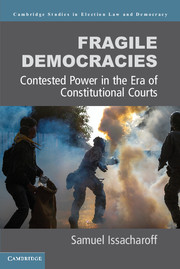Book contents
3 - Types of Threats
from PART I - MILITANT DEMOCRACY
Published online by Cambridge University Press: 05 July 2015
Summary
Banning political parties is not the desired end state of democracy. Rather, it is a prudent act to ward off an existential threat not yet realized. It is always possible that driving a party underground will harden its cadres, or gain them public sympathy as romantic figures of the Che Guevara sort. These are questions of prudence and tactics that can only be answered pragmatically. The question of principle is the justification for the ban, not whether it is wise under the particular circumstances.
Nor is it an objection to say that a party facing a ban is still weak. How much wiser to remove surgically a cancerous tumor when it is small rather than large. The wisdom of the incision depends on the proper diagnosis, not whether the patient is at death's door. Indeed, allowing an antidemocratic movement to mature into a mass party renders intervention quite unlikely to succeed.
The initial question of principle is therefore to identify the conditions that require democracies to assume a defensive posture against threats to their continued existence. In turn, this requires identifying the types of risk that democratic states consider to require removal from political participation. By and large, these party prohibitions fall into one of three categories, each of which raises a separate set of concerns.
First, there are prohibitions that result from groups having a terrorist or insurrectionary component based either domestically or abroad. The paramilitary side of these groups is independently subject to criminal prosecution or defensive military operations. Yet there is often a political wing that seeks to operate publicly and may serve as a legal or propagandistic front for terrorist or insurrectionary groups. A ready example is the complicated relationship between the Irish Republican Army's military wing and the Sinn Féin political branch.
- Type
- Chapter
- Information
- Fragile DemocraciesContested Power in the Era of Constitutional Courts, pp. 54 - 76Publisher: Cambridge University PressPrint publication year: 2015



